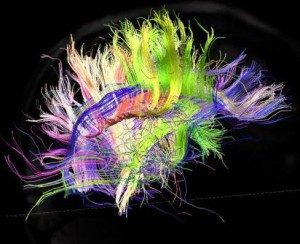16 September 2014. The pharmaceutical companies Eli Lilly and Company and AstraZeneca will jointly develop a drug to treat Alzheimer’s disease, currently in early-stage clinical trials. In the $500 million deal, Lilly is licensing research and development conducted so far by AstraZeneca, with the companies dividing up further clinical development, commercialization, and manufacturing of the drug.
In Alzheimer’s disease, amyloid plaque develops in the brain, breaking down the ability of neurons or nerve cells to function efficiently, leading to death of neurons and shrinkage of brain tissue. Cognitive and memory loss are common symptoms of Alzheimer’s disease, which is the leading form of dementia, affecting more than 5 million people and the 6th leading cause of death in the U.S.
The companies plan to advance AstraZeneca’s drug, code-named AZD3293, into intermediate and late-stage clinical trials as a treatment for people with early symptoms of Alzheimer’s disease. AZD3293 is an oral beta secretase cleaving enzyme, or BACE, inhibitor that aims to prevent the build-up of amyloid plaque toxicity.
The small molecule drug acts by cleaving an amyloid precursor protein that releases and activates peptides inhibiting BACE, which in turn reduces toxicity of amyloid beta peptides making up the accumulating plaque. AstraZeneca tested AZD3293 in early-stage clinical trials, beginning in 2012, which show the drug can reduce levels of amyloid beta peptides in cerebro-spinal fluid of both patients with Alzheimer’s disease and healthy volunteers.
Under the new agreement, Lilly, in Indianapolis, will lead further clinical development of AZD3293 into intermediate and late-phase trials among patients in the early stages of Alzheimer’s disease. The two companies will share commercialization of the drug, while AstraZeneca will be responsible for manufacturing.
Lilly will pay AstraZeneca, based in London, up to $500 million in development and regulatory payments, with the first payment of $50 million expected in the 3rd quarter of 2014. The two companies plan to share equally future development and commercialization costs, as well as net revenues worldwide after launch of the drug.
Read more:
- DARPA Funding Development of Brain Implants to Boost Memory
- NIH Funds $24 Million for Genetic Links to Alzheimer’s
- Portfolio Model Proposed for Funding Alzheimer’s Research
- Alzheimer’s Brain Stimulation Implants Completed for Trial
- IT Firm, University Partner on Alzheimer’s Research Platform
* * *


 RSS - Posts
RSS - Posts
You must be logged in to post a comment.